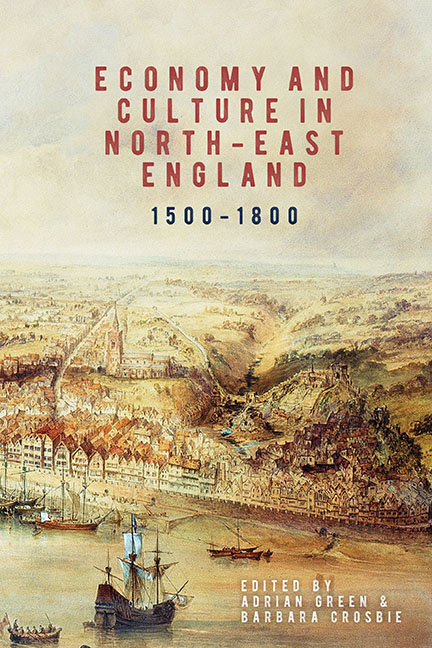Book contents
- Frontmatter
- Contents
- List of Maps, Figures and Tables
- Preface
- Contributors
- Foreword
- List of Abbreviations
- Map
- Introduction: ‘Beyond Coal and Class’: Economy and Culture in North-East England, 1500–1800
- 1 Church Leaseholders on Durham Cathedral's Estate, 1540–1640: The Rise of a Rural Elite?
- 2 Durham Ox: Commercial Agriculture in North-East England, 1600–1800
- 3 Fluctuating Fortunes: The Bowes Family and Lead Mining Concessions, 1550–1720
- 4 Material Matters: Improving Berwick-upon-Tweed's Urban Environment, 1551–1603
- 5 Work before Play: The Occupational Structure of Newcastle upon Tyne, 1600–1710
- 6 Maintaining Moral Integrity: The Cultural and Economic Relationships of Quakers in North-East England, 1653–1700
- 7 Shipping on the Tyne: The Growth and Diversification of Seaborne Trade in the Eighteenth Century
- 8 From Carboniferous Capitalism to Complementary Commerce: Coastal and Overland Trade between North-East England and Scotland, 1580–1750
- 9 Provincial Purveyors of Culture: The Print Trade in Eighteenth- Century Newcastle upon Tyne
- 10 Parish, River, Region and Nation: Networks of Power in Eighteenth-Century Wearside
- Bibliography
- Index
- Volumes Already Published
Foreword
Published online by Cambridge University Press: 13 July 2019
- Frontmatter
- Contents
- List of Maps, Figures and Tables
- Preface
- Contributors
- Foreword
- List of Abbreviations
- Map
- Introduction: ‘Beyond Coal and Class’: Economy and Culture in North-East England, 1500–1800
- 1 Church Leaseholders on Durham Cathedral's Estate, 1540–1640: The Rise of a Rural Elite?
- 2 Durham Ox: Commercial Agriculture in North-East England, 1600–1800
- 3 Fluctuating Fortunes: The Bowes Family and Lead Mining Concessions, 1550–1720
- 4 Material Matters: Improving Berwick-upon-Tweed's Urban Environment, 1551–1603
- 5 Work before Play: The Occupational Structure of Newcastle upon Tyne, 1600–1710
- 6 Maintaining Moral Integrity: The Cultural and Economic Relationships of Quakers in North-East England, 1653–1700
- 7 Shipping on the Tyne: The Growth and Diversification of Seaborne Trade in the Eighteenth Century
- 8 From Carboniferous Capitalism to Complementary Commerce: Coastal and Overland Trade between North-East England and Scotland, 1580–1750
- 9 Provincial Purveyors of Culture: The Print Trade in Eighteenth- Century Newcastle upon Tyne
- 10 Parish, River, Region and Nation: Networks of Power in Eighteenth-Century Wearside
- Bibliography
- Index
- Volumes Already Published
Summary
This collection seeks to contribute to our understanding of early modern England in two ways. Substantively, it provides a set of complementary studies of aspects of economic, social and cultural change in north-east England; a relatively neglected region, yet one that can reasonably claim to have played a major role in the making of modern Britain. As such it is the direct outcome of the quickening of research on the area stimulated by the activities of the North East England History Institute. Interpretatively, it attempts to explore the interconnections between economic expansion and cultural change (using a broad definition of ‘culture’ which encompasses institutions and practices as well as attitudes and understandings, values and motivations).
The adoption of a regional approach needs no defence. A quarter of a century has passed since Pat Hudson pointed out the misleading, even distorting, consequences of studying economic change at ‘aggregate national level’ and redirected attention to the ‘regional perspective’. As she argued, major economic change usually occurs ‘within regions rather than within nations as a whole’ and in the long process we call the Industrial Revolution ‘both economic structure and human agency … in important respects, operated at regional level’, in ‘provincial concentrations’. Close regional studies, then, are essential to the understanding of economic change and to the appreciation of ‘the variety of experience and motivation which makes up the whole’.
In this respect these essays have a good deal to offer. It would be wrong to argue that the economic and social history of the north-east between the sixteenth and the eighteenth centuries has been wholly neglected. Nevertheless, coverage of the area's early modern history remains distinctly uneven, chronologically, thematically and socially. Despite a number of valuable overviews, the developments of the sixteenth, seventeenth and early eighteenth centuries remain much less fully researched than those of the late eighteenth, nineteenth and early twentieth. The great exception, of course, is the early history of the coal industry, in which the contribution of the Durham and Northumberland coalfield has a justifiably central place. Other aspects of economic and social change which accompanied the rise of ‘carboniferous capitalism’, however, have been subject to preliminary exploration rather than sustained analysis.
- Type
- Chapter
- Information
- Economy and Culture in North-East England, 1500–1800 , pp. xiv - xxiiPublisher: Boydell & BrewerPrint publication year: 2018

